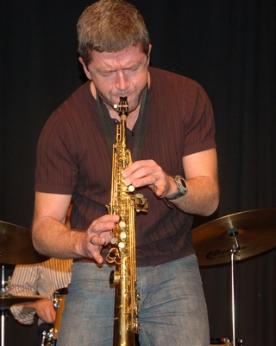|
| |
 Greg Lyons Greg Lyons
Masterclass 4
- for Listeners & Musicians
Cause v Effect -
Courtesy of Greg Lyons
This is the crucial question. The
core of the problem. This is the difference between making great music or making
irrelevant dross. The difference between having something to say or saying
something that sounds cool. Between giving something worthwhile to your fellow
humans or cheating them to get undeserved respect. Between the truth and a
lie.Those who seek the Effect are like the teacher who tells his student a lie
rather than admit not being ready with the answer. His
status
as teacher is more important to him that his
purpose
as teacher. He is after the Effect and has no Cause.
Those who have the Cause are like the man pained by the sufferings of his
community who decides to do something about it. Itís not a question of wanting
to be a good person, itís simply that doing that makes him happy. Those blessed
with a cause rarely have much choice in the matter, they are compelled to do
what they do because of who they are. They have an itch and they scratch it.
This all seems very straightforward, but in music it can sometimes be a nebulous
divide. We all grow up listening to the effect of other peoples causes. Those of
us drawn to music are drawn invariably through the effect that another musician
has on us. It brings us to music and gives a focus for our development. However
we hopefully discover early-on the pure joy of making beautiful sounds and this
overrides our desire to emulate our heroes.
At some point those of us that stay the course will then outgrow our
role-models and start to define what our own positions are. This is the most
vital stage of our evolution, one that Iím constantly trying to encourage my
fellow musicians and students to go through. In my view the crucial milestone is
our first composition.
Once we have a composition that we feel happy with, we have already defined a
lot about ourselves. We are then faced with the dilemma of how we want to
interpret it on our instrument and in what group. This too can help define a lot
of things about who we are as musicians. We will have to reassess how we play or
how we write in order to eventually come up with a holistic entity. It will
usually be a lengthy process of trial and error as we work our way through the
different options but it has the eventual outcome of helping define our musical
standpoint.
Does it then follow that you have to compose to have anything to say? Surely an
improvising musician is constantly composing. Improvisation and composition are
only differentiated by the transience of one and the permanence of the other.
The only element in composition that is missing from the process of
improvisation is the edit. With improvisation it is there and that's it - said
and done, whereas with composition we get to fine-tune what we want to say until
it's just right. Improvisation only gets this edit factor when it is recorded.
When we record, again we are faced with the possibility of re-doing or altering
something to change the way it sounds. The production of a recording is another
point at which we mature as artists. Hearing our effect will obviously affect
how we subsequently express ourselves. Many people record themselves regularly
and assess themselves and their development through listening to these
recordings.
Though this can help you define and alter some things about your Effect, it
obviously has little to do with your Cause. Too much focus on what you sound
like recorded can stunt your creativity, and ultimately I think this activity is
better left to those occasions when you are actually going to produce a
recording for others to hear. There are many artists who seem to find their
voice without composing. They may have tried writing but found that their
expression was better suited to existing material. Who could suggest that Billie
Holliday or Elis Regina had nothing to say? They selected other people's
compositions according to their purposes and breathed life into them in a
completely unique and definitive way.
I'm not saying that without composing you will never learn to express yourself,
only that the process of composition is a great boost to your development of a
personal standpoint - a Cause - and the sooner you start, the better. It's all
about having an opinion. For those who have one: there's no issue here, your
Cause is ingrained; but for those still undecided - you can't stand out on the
fence too long. Take the bull by the horns and get involved. Find something to
be passionate about. If you can't be passionate about music - do something else.
Greg's Website
|